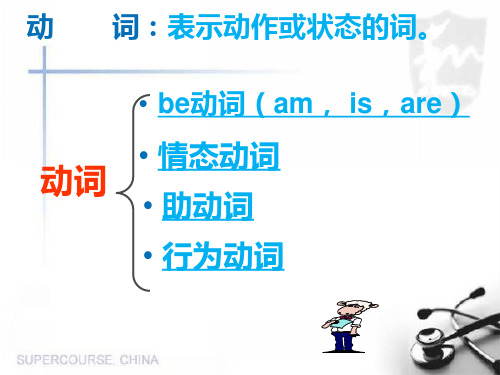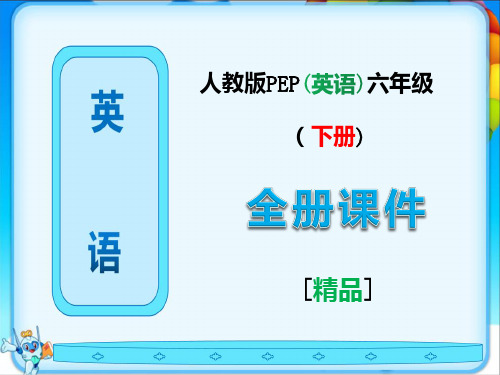小学六年级英语ppt
合集下载
人教版六年级上册英语全册课件PPT

strong强 stronger较强 strongest最强
(1) 形容词的比较级和最高级的构成方法如下:
a. 单音节词和少数双音节词以加-er和-est的方式构成:
情况
加词尾法
例词
一般情况
直接加词尾
small, smaller, smallest
以e结尾的词
加-r,-st
large, larger, largest
difficult more difficult most difficult
Listen and read the song aloud. Then answer the questions.
What is Papa going to do? _______________________ _______________________ ________________________
school
pet hosoital
library
We can go by bike/bus/on foot.
cinema
常常用表示步骤的词
描述事情的顺序时,我们常常用表示步骤的词,如: first 首先, then 然后,next下一步等。其顺序如下: • first 首先,一定放在最前面 • next下面 • then 然后 • finally 最后, 一定在最后面 根据事情步骤的多少,选择来用。如:
教学 分析
教学 目标
教学 学法
教学 设计
说课 效果
项目
I’m going to … I’m going there by … I’m going there in July…
If 的用法
• if 表示“如果”,与将来时的句子连用。例 如:If it rains tomorrow, I will go to the park. (如果明天下雨,我将会去公园。)
小学六年级英语语法总复习PPT课件

.
• 小学阶段不规则动词全表
• Infinitive Past tense Infinitive
• 1. am, is
was
2. keep
• 3.are
were
5. make made
4.become
7. blow
blew
8. read
• 9. buy
bought
10. ride
• 11. catch caught
fly-flying walk-walking
jump-jumping sleep-sleeping
climb-climbing fight-fighting
swing-swinging drink-drinking catch-catching pick-picking
watch-watching play-playing
dance danced
变y为 i+ed
study studied
动词的过去式(不规则)
go-went read-read eat-ate sing-sang take-took buy-bought see-saw swim-swam am,is-was do-did are-were have-had get-got leave-left fly-flew stop-stopped(双写)
.
• 一般现在时的变化
1. be动词的变化。
否定句:主语+ be + not +其它。 如:He is not a worker.他不是工人 一般疑问句:Be +主语+其它。 如:-Are you a student? -Yes. I am. / No, I‘m not. 特殊疑问句:疑问词+一般疑问句。如:Where is my bike?
• 小学阶段不规则动词全表
• Infinitive Past tense Infinitive
• 1. am, is
was
2. keep
• 3.are
were
5. make made
4.become
7. blow
blew
8. read
• 9. buy
bought
10. ride
• 11. catch caught
fly-flying walk-walking
jump-jumping sleep-sleeping
climb-climbing fight-fighting
swing-swinging drink-drinking catch-catching pick-picking
watch-watching play-playing
dance danced
变y为 i+ed
study studied
动词的过去式(不规则)
go-went read-read eat-ate sing-sang take-took buy-bought see-saw swim-swam am,is-was do-did are-were have-had get-got leave-left fly-flew stop-stopped(双写)
.
• 一般现在时的变化
1. be动词的变化。
否定句:主语+ be + not +其它。 如:He is not a worker.他不是工人 一般疑问句:Be +主语+其它。 如:-Are you a student? -Yes. I am. / No, I‘m not. 特殊疑问句:疑问词+一般疑问句。如:Where is my bike?
六年级英语书课件ppt课件ppt课件

Selection principles: Choose reading materials that are suitable for the English proficiency of sixth grade students, with a wide range of topics and interesting content.
02 03
Skimming and scanning
Teach skimming and scanning techniques to help students quickly grasp the main idea and key information of an article.
Context es
01
Introduction to 6th Grade English
Course objectives and requirements
Master basic English l…
Vocabulary, grammar, reading, writing, and speaking
Develop English language application abilities
02 03
Promote active learning
Encourage students to actively participate in class activities, collaborate with peers, and explore language learning through various channels
Reading strategy guidance and
01
Prediction
人教版英语六年级上册全册ppt课件

北海公园(Beihai Park),位于北京市中
心区,城内景山西侧,在故宫的西北面,与 中海、南海合称三海,属于中国古代皇家园 林。北海是中国历史园林的艺术杰作。全园 以北海为中心,水面占583市亩,面积约71 公顷,陆地占480市亩。这里原是辽、金、
元建离宫,明、清辟为帝王御苑,是中国现 存最完整、最古老、最具综合性和代表性的 皇家园林之一,1925年开放为公园,为中国 全国重点文物保护单位,是国家AAAA级旅
Wu yifan and his friends want to eat some pizza in an Italian r_e__gso_t_as_tur_ar_iga_h_nt_t_._T__h_e_y______._T__h_e_y______and __t_u_rn__le_f_t _a_t _thaenbdooktshtoeren turn right agtuarninri.ght
between…and…
在……和……之间 on…street在……街道上
Q: Where is the park? Q:The Zoo is _______ the post office. Q: The school is ______ the library.
Let’s try (page 6) 3’13”
the Thames.(在靠近泰晤士河的电影院旁边)
泰晤士河 The Thames,在英格兰牛津又称伊希 斯河(River Isis)。英国第二大的河流,也是最 重要的水路,又是英国的母亲河。
Zoom: Excuse me. Is The Thames far from here?(打扰一下,泰晤士河距离 这里远吗?)
火车=train
by train 乘坐火车
小学英语六年级动词ppt课件

一般现在时:do, does(用于第三 人称单数),do用于其他人称,
一般过去时:did
I don’t like English.
填空
1
1、 Do you like this magazine? 2、-What doesshe do at the weekends?
-She usually plays games with her friends.
注意:
(1)在一般现在时中,does用于第三人称 单数,其余一律用助动词do。
(2)助动词do,does,did后用动词原形。
为深入学习习近平新时代中国特色社 会主义 思想和 党的十 九大精 神,贯彻 全国教 育大会 精神,充 分发挥 中小学 图书室 育人功 能
助动词do
根据时态、主语人称、数的变化, do/ does/ did,
行为动词又称实义动词,表示动 作和状态
He speaksEnglish very well. 他英语讲得很好。
动词的基本形式 为深入学习习近平新时代中国特色社会主义思想和党的十九大精神,贯彻全国教育大会精神,充分发挥中小学图书室育人功能
原形 第三人称单数形式+s/es 现在分词+ing 过去式+ed
动 词:表示动作或状态的词。
• be动词(am, is,are)
动词 • 情态动词
• 助动词 • 行为动词
be动词 be动词:am,is,are, was, were be动词的否定形式: am not(没有缩略形式) are not=aren’t ,is not=isn’t 主语第一人称+am 主语第二人称+are 单数+is;复数+are
第三人称单数形式的变化
一般过去时:did
I don’t like English.
填空
1
1、 Do you like this magazine? 2、-What doesshe do at the weekends?
-She usually plays games with her friends.
注意:
(1)在一般现在时中,does用于第三人称 单数,其余一律用助动词do。
(2)助动词do,does,did后用动词原形。
为深入学习习近平新时代中国特色社 会主义 思想和 党的十 九大精 神,贯彻 全国教 育大会 精神,充 分发挥 中小学 图书室 育人功 能
助动词do
根据时态、主语人称、数的变化, do/ does/ did,
行为动词又称实义动词,表示动 作和状态
He speaksEnglish very well. 他英语讲得很好。
动词的基本形式 为深入学习习近平新时代中国特色社会主义思想和党的十九大精神,贯彻全国教育大会精神,充分发挥中小学图书室育人功能
原形 第三人称单数形式+s/es 现在分词+ing 过去式+ed
动 词:表示动作或状态的词。
• be动词(am, is,are)
动词 • 情态动词
• 助动词 • 行为动词
be动词 be动词:am,is,are, was, were be动词的否定形式: am not(没有缩略形式) are not=aren’t ,is not=isn’t 主语第一人称+am 主语第二人称+are 单数+is;复数+are
第三人称单数形式的变化
六年级英语下册全册ppt课件(pep人教版)

3/19/2024
thin
thinner
The tiger is thin. The dog is thinner.
Thin, thinner, the dog is thinner.
3/19/2024
big
bigger
The donkey is big. The horse is bigger.
1.1
PartA
3/19/2024
Warm-up
Let’s play a game.
Line up from shorter to taller. 请男生和女生分开,按从矮到高排成两 队,大家看看谁高?
3/19/2024
Presentation
tall-----taller long----longer young----younger
short----shorter 24
单词新朋友
tall-----taller 更高的 short----shorter 更矮的 old----older更年长的 young----younger更年轻的 long----longer 更长的
3/19/2024
询问他人体重及回答的句型.
How heavy are you / is he/she? I’m/He/She is 48kg.
3/19/2024
Work in pairs.
Practice
What size are Wu Yifan’s shoes? What size are your shoes? Whose shoes are bigger?
3/19/2024
Work in groups
How heavy are you? I’m___kilograms. You’re heavier than me.
thin
thinner
The tiger is thin. The dog is thinner.
Thin, thinner, the dog is thinner.
3/19/2024
big
bigger
The donkey is big. The horse is bigger.
1.1
PartA
3/19/2024
Warm-up
Let’s play a game.
Line up from shorter to taller. 请男生和女生分开,按从矮到高排成两 队,大家看看谁高?
3/19/2024
Presentation
tall-----taller long----longer young----younger
short----shorter 24
单词新朋友
tall-----taller 更高的 short----shorter 更矮的 old----older更年长的 young----younger更年轻的 long----longer 更长的
3/19/2024
询问他人体重及回答的句型.
How heavy are you / is he/she? I’m/He/She is 48kg.
3/19/2024
Work in pairs.
Practice
What size are Wu Yifan’s shoes? What size are your shoes? Whose shoes are bigger?
3/19/2024
Work in groups
How heavy are you? I’m___kilograms. You’re heavier than me.
六年级英语ppt课件

• Family time: spending time with family members is an important part of weekend activities People can have family dinner, chat with family members, or watch TV together
Encourage students to speak up and ask questions to enhance their language skills
Note taking
Teach students effective note taking skills to record key information
Discussing daily activities
01
Importance of daily activities
daily activities are essential for maintaining physical and mental health, improving self-care ability, and promoting social development
2023-2026
ONE
KEEP VIEW
6th grade English PowerPoint courseware
REPORTING
CATALOGUE
目 录
• Unit 1 Greetings and Introduction • Unit 2 Learning and School Lif • Unit 3 Food and Beverages • Unit 4 Daily Life and Activity • Unit 5 Weather and Seasons
Encourage students to speak up and ask questions to enhance their language skills
Note taking
Teach students effective note taking skills to record key information
Discussing daily activities
01
Importance of daily activities
daily activities are essential for maintaining physical and mental health, improving self-care ability, and promoting social development
2023-2026
ONE
KEEP VIEW
6th grade English PowerPoint courseware
REPORTING
CATALOGUE
目 录
• Unit 1 Greetings and Introduction • Unit 2 Learning and School Lif • Unit 3 Food and Beverages • Unit 4 Daily Life and Activity • Unit 5 Weather and Seasons
人教版PEP六年级英语上册全册课件【完整版】

紧挨着 在后边 在前面 在中间 在右边 在左边
next to behind in front of between on the right on the left
Wudu
c•icneinmeama
bookstoremuFra bibliotekeumpost office
hospital
hospital
• Guess:
• Make a map
•homework
•1 copy words
p.5
•2 copy sentences p.5
That is all!
Bye bye.
Unit1 How can I get there?
PartA Let’s learn
哈哈哈!!Do you like me?
science museum
人教版PEP
全册精品PPT课件
Unit 1 How can I Unit 2 Ways to go Unit 3 My weekend
get there?
to school
plan
A
2套
A
2套
A
2套 Recycle 1
2套
B
2套
B
2套
B
2套
C
2套
C
2套
C
2套
Unit 4 I have a pen Unit 5 What does Unit 6 How do you
Part B let'talk
science museum
post office
hospital
cinema
bookstore
library
人教版六年级英语上册优秀课件(全套)

短语 例句
in hospital 住院
in the hospital 在医院里
Is there a pet hospital here? 附近有一个宠物医院吗?
重难点探究
重点句型
— Where is the cinema? 电影院在哪儿? — It’s next to the bookstore. 它紧挨着书店。
课前热身
Let’s sing!
If you’re happy
If you’re happy and you know it,
如果你愉快并且知道你愉快,就
Clap your hands,
If you’re happy and you know it, Clap your hands,
拍拍你的手。
如果你愉快并且知道你愉快,就 拍拍你的手。
复数形式
例句
bookstores
Where is the bookstore? 书店在哪儿?
重难点探究
重点词汇5
cinema /ˈsɪnəmə / (名词)电影院
复数形式 例句
cinemas
The cinema is next to park. 电影院紧挨着公园。
重难点探究
重点词汇6
hospital /'hɒspɪt(ə)l/ (名词)医院
新词展示
新词展示
Let’s play a game!
science museum post office
bookstore
cinema hospital
课文朗读
点击“Let's learn”,跟 我一起学词汇吧!
Let's learn
课文原文
- 1、下载文档前请自行甄别文档内容的完整性,平台不提供额外的编辑、内容补充、找答案等附加服务。
- 2、"仅部分预览"的文档,不可在线预览部分如存在完整性等问题,可反馈申请退款(可完整预览的文档不适用该条件!)。
- 3、如文档侵犯您的权益,请联系客服反馈,我们会尽快为您处理(人工客服工作时间:9:00-18:30)。
第一课至第六课的知识点的梳理
Lesson 4
Lesson 1
Lesson 2
Lesson 5
Lesson 3
Lesson 6
Do you always have lunch at twelve?
Lesson1
能够运用主题句型 Do you always have
lunch at twelve?进行交际。
动词单三变化规则
1. 一般在动词之后直接加s,在清辅音后发音为 [s], 在浊辅音及元音后发音为 [z] 例如:stop-stops [s] ; make-makes [s] ②read-reads [z] ; play-plays [z] 2. 以sh/ch/s/x结尾的词+es, 发音为[iz] 例如:teach-teaches [iz]; watch- watches [iz] 3. 以辅音字母+y结尾的, 把y变成i, +es,读作 [iz]
一般现在时态
定义:一般现在时表示现在经常反复发生的动作、 存在的状态或习惯性的动作的时态。 I often go to school by bike. It is hot today. I always have lunch at twelve. 一般现在时的标志 标志词(时间状语):always, uausally, every week (day, year, month…), once a week, sometimes, on Sunday, often, never, hardly...
例如:study—studies 4.辅音字母+o结尾的+es,读作[z] 例如:go—goes[z] do--does[z] 下面几个动词变为单数时,原词的元音部 分的发音发生了较大的变化,请注意记忆。 如: 1、do [du:]-does [dʌz]
2、say [sei]-says [sez] 3 、have-has
一般现在时句型结构:
肯定句:主语(除单三人称外所有人称)+实义 动词+其它. 否定句:主语+don’t +动词原形+其它. 疑问句: Do +主语+动词原形+其它? 回答:Yes,主语+do. No, 主语+don’t. 注意:当主语为单数第三人称时句型结构: 肯定句: 主语+V单三+其它. 否定句: 主语+doesn’t +V原+其它. 疑问句: Does +主语+V原+其它? 回答: Yes ,主语+does. No,主语+doesn’t.
小学六年级英语 知识要点专题讲座
八一中心小学 刘盛蓉
• 教材分析及目标
本教材是六年级上册用书,有12课,每个单元分三部分,其中 每课有let’s talk let’s learn let’s sing let’s practise四个环节
1、能按四会、三会的要求掌握所学单词。 2、能按四会要求掌握每课所学句型。 3、掌握每一课重要词汇
常见国家及首都 China---Bei Jing England---London France---Paris
America(USA)---New York Russia---Moscow Japan---Tokyo
come from=be from来自于… too,也,通常用在肯定句末尾 look for 寻找 take a seat坐下==sit down type(动词)---typist(名词) by the way顺便问一下 after three months=in three months三个月后 all right=O.K.好吧
熟读背诵 let’s talk
复习常见疑问词 What什么 Who谁 Whose谁的 Which哪一个 When什么时What time 时间(具体几点几分) Why原因,为什么Where地点,哪里How 方式, 怎样 词汇加油站: “how+形容词、副词”引导的特殊疑问词组: How many/much 多少Haw far 多 远Haw long 多久(询问时间)/多长(询问距离)How soon 多快(询问时 间)How old 多大How often 多久(询问频率) 习题:句子加工厂 My name is Rose. (对划线部分提问) I live in New York. (对划线部分提问) She is my best friend. (对划线部分提问) She often walks to school. (对划线部分提问) My mom usually makes breakfast at 8:00. (对划线部分提问) That’s her book. (对划线部分提问) Where are you from?(同义句) She always gets up before six. (对划线部分提问) Lucy often does homework on Sunday. (对划线部分提问) I usually have milk and bread for breakfast. (对划线部分提问)
4、能使用日常交际用语,活用四会句型,进行简单的交流, 做 到大胆开口,发音正确。
5、能在图片、手势、情境等非语言提示的帮助下,听懂清晰 的话语和录音。
• 教学方法
创设各种情境,鼓励用英语交谈,频繁的让学生参 与小组活动,并要求他们自编英语对话,通过游戏、 歌曲和角色表演等,使学生用英语交流。每课结束 后,放录音听写,及练习学生的听力也为学生的笔 试打下基础。
各人称复数
We/You/Th We/You/They ey are are not teacher teachers. s.
Yes, you/we/they are. we/you/the No, you/we/they aren’ y teachers?
词汇集中营 It’s time to do sth. =It’s time for sth. 该做。。。的时候到了 wake up醒来 have lunch 吃午饭 do morning exercises做早操 have no time没有时间 either,也… 通常用在否定句末尾 make breakfast做早饭 there’s something wrong with … …出毛病了
人称,数 形式
I am not a 第一人称单数 I am a teacher. teacher.
You aren’t a 第二人称单数 You are a teacher. teacher.
第三人称单数 He/She is a He/She is not a teacher. teacher. It is Mary. It isn’t Mary.
重点语句
Does she always come here? A barking dog doesn’t bite. take a walk=go for a walk散步orts做运动 put on…穿(戴上)… ask sb. To do sth.叫某人做某事 be afraid of …害怕… the old saying古老的谚语 go out with sb.和某人一起出去 begin=start开始
一般现在时 一般现在时通常表示经常发生的动作或存 在的状态。be动词的一般现在时
肯定式 否定式 疑问式 简略回答 Am I a teacher? Yes, you are. No, you aren’t. Are you a teacher? Is he/she a teacher? Is it Mary? Are Yes, I am. No, I’ not. Yes, he/she is. No, he/she isn’t. Yes, it is . No, it isn’t.
Lesson3 where do you live?
本节课继续学习一般现在时态,重点学习 这一时态的特殊疑问句形式及相关答语, 包括第三人称单数形式。 熟练掌握新单词和词组 能在实际情景中运用句型:“where do you come form” I come from···where do you live? I live in· · · 能听懂会说句子 Where does she come from?She come from....并在语境中进行交 际。
学习一般现在时
词汇集中营
教学重点
1. 2. 3. 4. 5.
问时间的句型:What time is it?或 What’s the time? 固定句型:It’s time for...“该做/干…了。或“到…的时 词组:have lunch/breakfast/supper; 句子:What ab 具体几点几分前用介词at. 交际用语:—— Do you always have lunch at twelve —— Yes,I do./ No, I don’t. —— What do you have for breakfast? —— I usually have milk and bread . 6. 频度副词:sometimes, often, usually, always;其用法 也可放在句首;放在句中时,要置于实义动词之前,be动词
Lesson 2 Does she always come here?
掌握本课短语词汇 掌握第三人称动词改变
掌握一般现在时句型结构
重点单词讲解
1. put on 表示穿戴的动作。 wear 是“穿着”,“戴着”的意思,可用 于穿衣、穿鞋、戴帽子,戴手套、佩戴首饰 等,强调状态。 Eg: Please put on your hat . He wears his hat. 2. be afraid of 害怕某物、某人…. I’m afraid of the dog. He’s afraid of the tiger.
